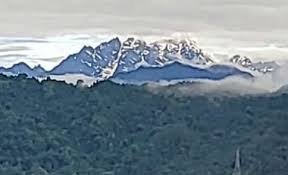
India has raised urgent concerns about the accelerating retreat of glaciers and its severe implications for water security, biodiversity, and the livelihoods of billions of people. Minister of State for Environment, Kirti Vardhan Singh, emphasized these points during his address at a high-level international conference on Glaciers’ Preservation held in Dushanbe, Tajikistan, on Saturday.
Singh highlighted the global and regional consequences of glacier retreat, particularly its disproportionate impact on mountainous regions such as the Himalayas. He underscored India’s unique vulnerability as a country intrinsically linked to the Himalayan ecosystem. The minister also detailed India’s ongoing efforts aimed at monitoring glaciers and adapting to climate change impacts.
Key among these initiatives is the National Mission for Sustaining the Himalayan Ecosystem (NMSHE), a vital component of India’s National Action Plan on Climate Change (NAPCC). India has also established a Centre for Cryosphere and Climate Change Studies, which focuses on advancing research and monitoring of glaciers and glacial lakes in the Indian Himalayan Region.
To enhance scientific understanding, India is leveraging advanced Remote Sensing and Geographic Information System (GIS) technologies, spearheaded by the Indian Space Research Organisation (ISRO). This technology is used to track changes in glacier mass, extent, and dynamics systematically. Collaborative research efforts are ongoing with national institutions such as the National Centre for Polar and Ocean Research (NCPOR), National Institute of Hydrology (NIH), Wadia Institute of Himalayan Geology, and the GB Pant National Institute of Himalayan Environment (NIHE).
Singh also stressed the importance of disaster preparedness in the Himalayan region, mentioning improvements in early warning systems and Glacial Lake Outburst Flood (GLOF) risk mapping. These efforts are coordinated by the National Disaster Management Authority (NDMA). The minister called for enhanced regional cooperation to strengthen resilience, improve data-sharing frameworks, and foster coordinated responses to the challenges confronting mountain ecosystems.
Highlighting India’s stance on international climate action, Singh reaffirmed the country’s commitment to the principle of Common but Differentiated Responsibilities and Respective Capabilities (CBDR–RC). He pointed out that although South Asia contributes minimally to global cumulative emissions, the region remains highly vulnerable to the impacts of climate change.
The conference in Tajikistan provided a crucial platform for nations to address glacier preservation collectively, and India’s active participation reflects its deep concern and proactive approach toward safeguarding the Himalayan ecosystem and the millions dependent on its resources.
Sources By Agencies

